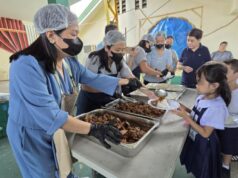Department of Health Regional HIV Program Manager Joseph Michael Manlutac. (Jag Lyra D. Costamero/PIA 3)
CITY OF SAN FERNANDO, Pampanga — Department of Health (DOH) appealed to the youth of Central Luzon to participate in responding against human immunodeficiency virus (HIV) amidst the escalating cases among them.
During the first and second leg of the Kilos Kabataan Kontra HIV at TB webinar which was participated by Pampanga and Bataan youngsters, DOH Regional HIV Program Manager Joseph Michael Manlutac reported that three in ten recorded HIV cases were among young people aged 15 to 24 years old.
“About half of our estimated [HIV] cases are coming from the youth sector that is why we are asking for your active involvement in your advocacies for you to help us on how are we going to penetrate our youth or our young key population,” he said in his presentation during a virtual forum with various youth leaders in the province.
The country records an average of 30 HIV cases per day, making the total number of persons living with HIV (PLHIV) at 86,617 as of May 2021.
In addition, Manlutac said that the spike in cases is exacerbated by the fact that only a few young people are empowered with the knowledge, skills, and capability to protect themselves from the virus.
“We saw that as the age group lowers, the level of their knowledge and information about HIV also lowers… It really boils down on information dissemination or the importance of information, for us to provide interventions for our program,” he said.
The health official explained it is more likely that young people are unaware of the fact that they can protect themselves; that they can get help from other people or facilities for treatment; or that they are reluctant to go to facilities which should be safe spaces for them.
Also, Manlutac highlighted that what led to the surge of PLHIVs is that risky behaviors among the youth start early, while protective behaviors begin late.
He shared that the median age of engaging in risky behaviors starts at 16 or 17, while the use of preventive commodities such as condoms usually starts at 19, which raises the possibility for people to get infected not only with HIV, but also with other Sexually Transmitted Infections.
“Our key population just starts being tested at the age of 21. Imagine, from the age of 16, there is a five-year gap before knowing their HIV status. If in case they are positive and continue risky behaviors, they must have infected their sexual partners that is why we have to correct it. We have to start protective behaviors early, and reduce our risky behaviors,” he stressed.
With this, Manlutac appealed to the youth to be more engaging in discussions about HIV and other sexual health issues to prevent and control the cases, given that previous generations are aloof to be involved in such programs.
“We hope that our advocacy focuses on two things: being a pro-active member of the society for our HIV program implementation; and preventing the stigma and discrimination not only to HIV-positive individuals, but to other marginalized sectors in our society,” Manlutac addressed.
He sought the help of the youth leaders to maintain an open connection to other development partners, such as community-based organizations, on suitable projects for them to be easily mobilized.
Also, Manlutac urged the youth leaders to use their platforms and influence and take the lead in designing various activities anchored on HIV prevention and control in their respective communities.
“We hope that the good news about HIV will also be shared. I hope that we sustain the convergence…because if we will be creating this demand generation, we will improve our service uptake and generally improve the welfare of our community and our PLHIVs,” he stated.
Manlutac suggested that youth leaders can utilize social media and do activities online to repackage their advocacy to connect with others, and cope up with the limitations brought by the pandemic.
Kilos Kabataan Kontra HIV at TB is a series of webinars co-organized by PIA and United States Agency for International Development TB Platforms in partnership with Department of Health and the Sangguniang Kabataan Federations of Central Luzon. (MJSC/JLDC-PIA 3)





